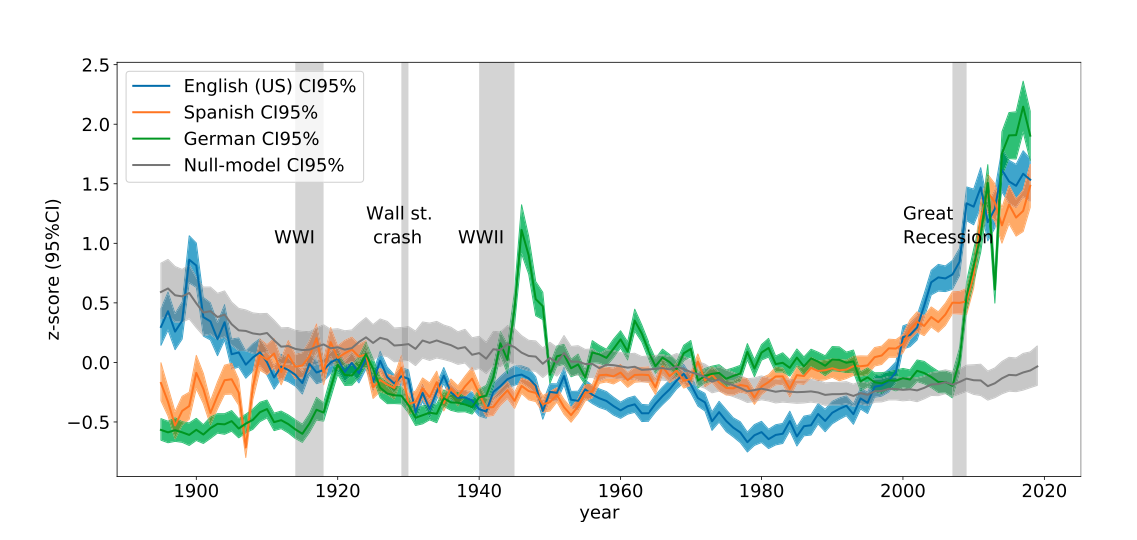|
|
| Пишет Open Culture ( @ 2021-07-28 14:00:00 |
|
|
|
|
|
|
|
|
|
|
|
|
|
|

The relations between thought, language, and mood have become subjects of study for several scientific fields of late. Some of the conclusions seem to echo religious notions from millennia ago. “As a man thinketh, so he is,” for example, proclaims a famous verse in Proverbs (one that helped spawn a self-help movement in 1903). Positive psychology might agree. “All that we are is the result of what we have thought,” says one translation of the Buddhist Dhammapada, a sentiment that cognitive behavioral therapy might endorse.
But the insights of these traditions — and of social psychology — also show that we’re embedded in webs of connection: we don’t only think alone; we think — and talk and write and read — with others. External circumstances influence mood as well as internal states of mind. Approaching these questions differently, researchers at the Luddy School of Informatics, Computing, and Engineering at Indiana University asked, “Can entire societies become more or less depressed over time?,” and is it possible to read collective changes in mood in the written languages of the past century or so?
The team of scientists, led by Johan Bollen, Indiana University professor of informatics and computing, took a novel approach that brings together tools from at least two fields: large-scale data analysis and cognitive-behavioral therapy (CBT). Since diagnostic criteria for measuring depression have only been around for the past 40 years, the question seemed to resist longitudinal study. But CBT provided a means of analyzing language for markers of “cognitive distortions” — thinking that skews in overly negative ways. “Language is closely intertwined with this dynamic” of thought and mood, the researchers write in their study, “Historical language records reveal a surge of cognitive distortions in recent decades,” published just last month in PNAS.
Choosing three languages, English (US), German, and Spanish, the team looked for “short sequences of one to five words (n-grams), labeled cognitive distortion schemata (CDS).” These words and phrases express negative thought processes like “catastrophizing,” “dichotomous reasoning,” “disqualifying the positive,” etc. Then, the researchers identified the prevalence of such language in a collection of over 14 million books published between 1855 and 2019 and uploaded to Google Books. The study controlled for language and syntax changes during that time and accounted for the increase in technical and non-fiction books published (though it did not distinguish between literary genres).

What the scientists found in all three languages was a distinctive “‘hockey stick’ pattern” — a sharp uptick in the language of depression after 1980 and into the present time. The only spikes that come close on the timeline occur in English language books during the Gilded Age and books published in German during and immediately after World War II. (Highly interesting, if unsurprising, findings.) Why the sudden, steep climb in language signifying depressive thinking? Does it actually mark a collective shift in mood, or show how historically oppressed groups have had more access to publishing in the past forty years, and have expressed less satisfaction with the status quo?
While they are careful to emphasize that they “make no causal claims” in the study, the researchers have some ideas about what’s happened, observing for example:
The US surge in CDS prevalence coincides with the late 1970s when wages stopped tracking increasing work productivity. This trend was associated with rises in income inequality to recent levels not seen since the 1930s. This phenomenon has been observed for most developed economies, including Germany, Spain and Latin America.
Other factors cited include the development of the World Wide Web and its facilitation of political polarization, “in particular us-vs.-them thinking… dichotomous reasoning,” and other maladaptive thought patterns that accompany depression. The scale of these developments might be enough to explain a major collective rise in depression, but one commenter offers an additional gloss:
The globe is *Literally* on fire, or historically flooding – Multiple economic crashes barely decades apart – a ghost town of a housing market – a multi-year global pandemic – wealth concentration at the .01% level – terrible pay/COL equations – blocking unionization/workers rights – abusive militarized police, without the restraint or training of actual military – You can’t afford X for a monthly mortgage payment! Pay 1.5x for rent instead! – endless wars for the last… 30…years? 50 if we include stuff like Korea, Cold War, Vietnam… How far has the IMC been milking the gov for funds to make the rich richer? Oh, and a billionaire 3-way space race to determine who’s got the biggest “rocket”
These sound like reasons for global depression indeed, but the arrow could also go the other way: maybe catastrophic reasoning produced actual catastrophes; black and white thinking led to endless wars, etc…. More study is needed, says Bollen and his colleagues, yet it seems probable, given the data, that “large populations are increasingly stressed by pervasive cultural, economic, and social changes” — changes occurring more rapidly, frequently, and with greater impact on our daily lives than ever before. Read the full study at PNAS.

Related Content:
Stanford’s Robert Sapolsky Demystifies Depression, Which, Like Diabetes, Is Rooted in Biology
Josh Jones is a writer and musician based in Durham, NC. Follow him at @jdmagness
Are We All Getting More Depressed?: A New Study Analyzing 14 Million Books, Written Over 160 Years, Finds the Language of Depression Steadily Rising is a post from: Open Culture. Follow us on Facebook and Twitter, or get our Daily Email. And don't miss our big collections of Free Online Courses, Free Online Movies, Free eBooks, Free Audio Books, Free Foreign Language Lessons, and MOOCs.